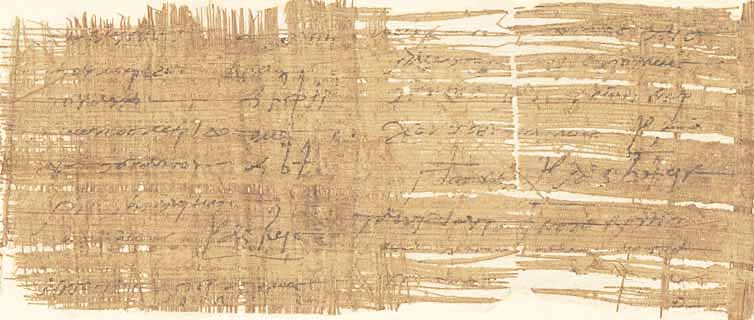P. 16985
Homer is one of the most famous Greek poets of all time. Everyone has heard of his two works, the Iliad and the Odyssey. On these fragments of papyrus, of which only some of the larger ones can be seen here, there are remains of an edition of the Iliad, which was produced in the 1st century BC.
In the Iliad, a part of the Trojan War is sung, the legendary siege of Troy in Asia Minor by the Greeks, which was caused by the robbery of the beautiful Helen by the Trojan prince of Paris and has only been ended by the cunning of Odysseus – the Trojan horse – after a ten-year struggle.
Remains of the 21st to 23rd books have survived on the fragments of our papyrus scroll. They describe the events after the death of Patroclus: Achilles, who has made peace again with the leader of the Greeks Agamemnon and wants to take revenge on Hector for Patroclus‘ death, is now fighting in the first line against the Trojans.
In the remains of the 21st book, which are preserved on these papyrus fragments, it is reported how Achilles pursued the Trojans into the river Skamandros, dishonoured the river god and could only be saved by the intervention of other gods (above all Hephaistos). This causes a battle between the Greek-friendly and Trojan-friendly gods, at the end of which the god Apollo stays behind to distract Achilles and, thus, to cover the escape of the Trojans into the city. The intervention of the gods on both sides of this war is a major theme in the whole Iliad.
In the verses of the 22nd book preserved here, the famous duel between Hector and Achilles is described among other things. Hector does not take refuge with the other Trojans in the safe city, but takes up the fight with Achilles, which ends with his death. In the second part of this book, the Trojans moan about the death of their hero. On the papyrus fragments presented here the lamentations of Hector’s father Priam, the King of Troy, are preserved and especially the moaning of Hector’s wife Andromache, who learned of his death only late.
Only the first two verses of the 23rd book have survived on these fragments, which starts with a description of the preparation for Patroclus‘ burial. In summary, these fragments of a once very magnificent complete edition of the Iliad prove very impressively that this important work of Greek literature was already regarded as a classic in antiquity and was widespread in late-Ptolemaic and early Roman Egypt.





